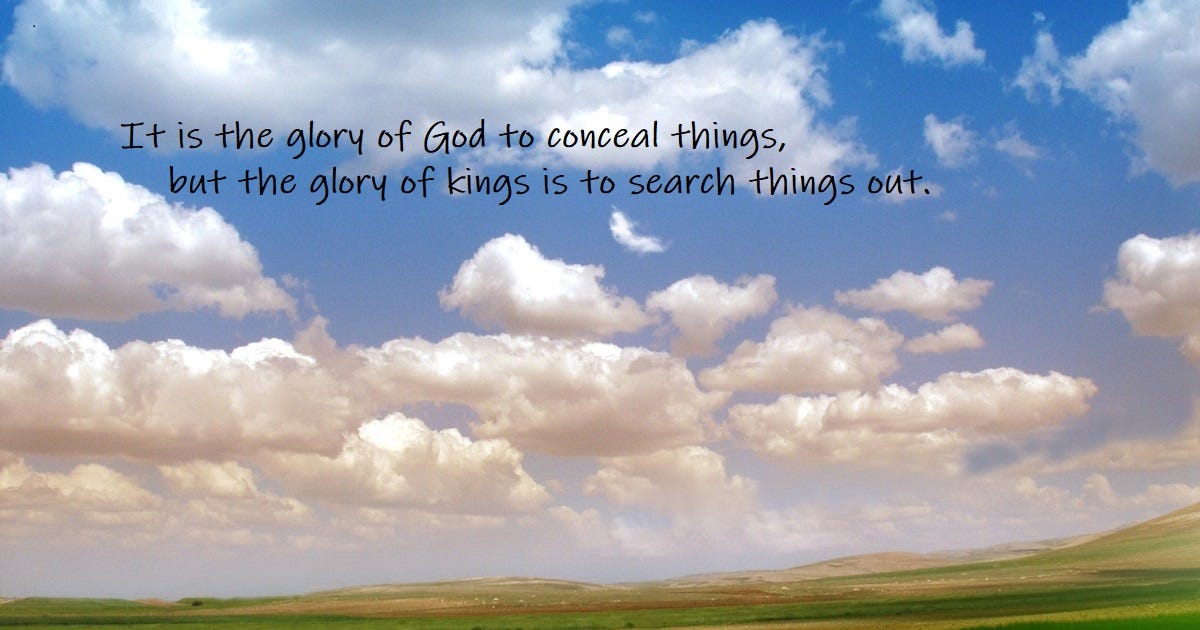Why Late Western Christians Need to Know Proverbs

Christians of every age and every circumstance need to know the entire Bible. That’s a given.
But Proverbs could be especially useful to contemporary Christians in the developed world. Here are three reasons why:
1. Proverbs is about masculinity.
Proverbs is for everyone, but it addresses itself explicitly to “my son”–a male somewhere near the threshold of adulthood. It is written to a young man who is strong enough to be an attractive recruit for a gang (he’s got muscles, Proverbs 1) and to be pursued as a diversion by a bored, rich, housewife (Proverbs 7). Proverbs pleads with the son to not forget the way his father and mother have raised him and also to build on that by pursuing Wisdom. Being faithful to one’s wife and embracing Lady Wisdom are presented as the mission of young males.
Proverbs not only opens with this theme in the first book (chapters 1-9), but the last book (Proverbs 31) repeats the theme, spoken by a king’s mother. She begs her son not to degrade himself by excessive wine and loose women. Rather, he should rule well, especially by choosing the right woman to marry. “Charm is deceitful, and beauty is vain, but a woman who fears the LORD is to be praised” (verse 30).
In an age that actively promotes the confusion of genders and invented the term “toxic masculinity,” a book of the Bible aimed at inculcating the art of manliness in young men has great value.
2. Proverbs is about the temptations to decadence that come with prosperity.
We are told that Solomon, at the height of his reign, “made silver as common in Jerusalem as stone” (1 Kings 10:27a). The rise of the monarchy was also a time of real economic change due to God’s blessing. Israel became more prosperous and more urban. Even though Isreal was agrarian by our standards, new ways of making a living in trades in cities would be more available.
So what temptations does Solomon emphasize? “He who gathers in summer is a prudent son, but he who sleeps in harvest is a son who brings shame” (Proverbs 10:5). “Slothfulness casts into a deep sleep, and an idle person will suffer hunger” (Proverbs 19:15). “Love not sleep, lest you come to poverty; open your eyes, and you will have plenty of bread” (Proverbs 20:13). Moses doesn’t say anything about the danger of oversleeping and Solomon can’t shut up about it.
The same is true of alcohol. The “drunkard” is mentioned as a bad person in the Law, but wine and strong drink otherwise have positive connotations. Long warnings about drinking don’t occur in the Bible until the time of Solomon.
Proverbs is written to people who have more wealth around them. Thus it is written to people who are more likely to feel entitled and to grow in vices that will ultimately destroy them. I doubt any farmer allowed his son to sleep during harvest. But in a more prosperous and cosmopolitan environment, it may have been easier for a young man to stay out too late drinking and be late for work the next day. The temptation might be to think there are no serious consequences to worry about, but Proverbs warns that the consequences sneak up on you later.
3. Proverbs is about freedom from your own behavior.
Whether we call them vices, bad habits, addictions, compulsive behaviors, or something else, Proverbs warns about being enslaved to desires and behaviors that will hurt you:
“Whoever is slow to anger is better than the mighty, and he who rules his spirit than he who takes a city” (Proverbs 16:32).
“A man without self-control is like a city broken into and left without walls” (Proverbs 25:28).
“The righteousness of the upright delivers them, but the treacherous are taken captive by their lust” (Proverbs 11:6).
“Do not desire her beauty in your heart, and do not let her capture you with her eyelashes” (Proverbs 6:25).
“The desire of the sluggard kills him, for his hands refuse to labor” (Proverbs 21:25).
“Do not give your strength to women, your ways to those who destroy kings” (Proverbs 31:3).
“Make no friendship with a man given to anger, nor go with a wrathful man, lest you learn his ways and entangle yourself in a snare” (Proverbs 22:24–25).
“Wine is a mocker, strong drink a brawler, and whoever is led astray by it is not wise” (Proverbs 20:1).
From having a quick temper to being an alcoholic, Proverbs is constantly warning us about using fleeting pleasures to feel better that will undercut our long-term happiness.
You need to wrestle with Proverbs.
Partly that means memorize portions of it. Partly that means read it regularly. But it means more. “It is the glory of God to conceal things, but the glory of kings is to search things out” (Proverbs 25:2). Proverbs is a guide to “the words of the wise and their riddles” (1:6). If a saying seems too simple, you probably aren’t understanding it.
We are told in the Bible that God made Solomon wise. Reading him and others as conveyers of simple moral truths is to obstruct your own ability to understand Proverbs. “Do you see a man who is wise in his own eyes? There is more hope for a fool than for him” (Proverbs 26:12).
Mark Horne is the executive director of Logo Sapiens Communication.
The post Why Late Western Christians Need to Know Proverbs appeared first on Kuyperian Commentary.

